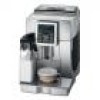DeLonghi ECAM23450SL Owner Manual - Page 15
Cleaning
 |
View all DeLonghi ECAM23450SL manuals
Add to My Manuals
Save this manual to your list of manuals |
Page 15 highlights
CLEANING Important! • Do not use solvents, abrasive detergents or alcohol to clean the coffee maker. With De'Longhi superautomatic coffee makers, you need not use chemical products to clean the machine. • None of the components can be washed in a dishwasher apart from the milk container (D). • Do not use metal objects to remove encrustations or coffee deposits as they could scratch metal or plastic surfaces. Cleaning the coffee grounds container When "EMPTY GROUNDS CONTAINER" is displayed, the grounds container must be emptied and cleaned. Until the grounds container has been cleaned, the appliance continues to display the message and coffee cannot be made. Important! Danger of burns If you make a number of cappuccinos one after the other, the metal cup tray becomes hot. Wait for it to cool down before touching it and handle it from the front only. To clean (with the machine on): • Remove the drip tray (fig. 22), empty and clean. • Empty the grounds container and clean thoroughly to remove all residues left on the bottom. This can be done with the spatula on the brush provided. • Check the condensate tray (red) and empty if necessary. Important! When removing the drip tray, the grounds container must be emptied, even if it contains few grounds. If this is not done, when you make the next coffees, the grounds container may fill up more than expected and clog the machine. Cleaning the drip tray and condensate tray showing the level of water it contains (fig. 23). Before the indicator protrudes from the cup tray, the drip tray must be emptied and cleaned, otherwise the water may overflow the edge and damage the appliance, the surface it rests on or the surrounding area. To remove the drip tray: 1. Remove the drip tray and the grounds container (fig. 22); 2. Empty the drip tray and grounds container and wash them; 3. Check the red condensate tray and empty if necessary. 4. Replace the drip tray and grounds container. Cleaning the inside of the coffee maker Danger of electric shock! Before cleaning internal parts, the machine must be turned off (see "Turning off") and unplugged from the mains power supply. Never immerse the coffee maker in water. 1. Check regularly (about once a month) that the inside of the appliance (accessible after removing the drip tray) is not dirty. If necessary, remove coffee deposits with the brush provided or a sponge. 2. Remove the residues with a vacuum cleaner (fig. 24). Cleaning the water tank 1. Clean the water tank (A9) regularly (about once a month and whenever you replace the water softener filter (if provided) with a damp cloth and a little mild dish soap. 2. Remove the filter (if present) and rinse with running water. 3. Replace the filter (if provided), fill the tank with fresh water and replace the tank. Cleaning the coffee spouts 1. Regularly clean the coffee spouts with a sponge or cloth (fig. 25A). 2. Check the holes in the coffee spout are not blocked. If necessary, remove coffee deposits with a toothpick (fig. 25B). Important! The drip tray is fitted with a level indicator (red) Cleaning the pre-ground coffee funnel Check regularly (about once a month ) that the 16















